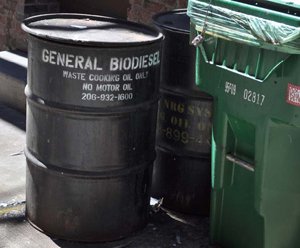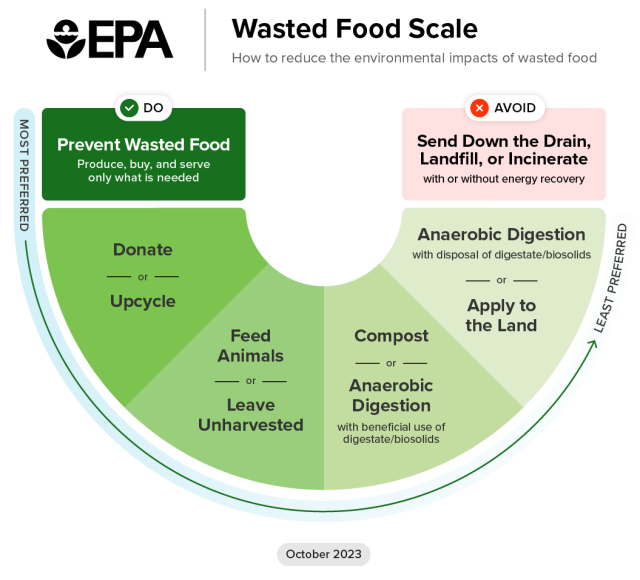Links and Resources About Food Recovery in Reno
EPA’s Wasted Food Scale ranks these food waste reduction activities from most preferred to least preferred.
On this page:
- Prevent Wasted Food
- Donate or Upcycle
- Feed Animals
- Anaerobic Digestion, and Fats, Oils & Grease
- Compost
Prevent Wasted Food
Produce, buy, and serve only what is needed. There are many resources available to prevent wasted food:
- EPA Food Recovery Website
-
Food and Packaging Waste Prevention Tool (xlsm)
Tracks the amount and reasons specific foods are wasted. - Reducing Wasted Food & Packaging: A Guide for Food Services and Restaurants (pdf)
- A Guide to Conducting and Analyzing a Food Waste Assessment (pdf)
-
Food and Packaging Waste Prevention Tool (xlsm)
- National Restaurant Association ConServe Program
Provides resources and tools to help restaurants through each step of a food waste reduction program; provides videos to accompany many of the EPA resources listed above. - Leanpath
Company assists foodservice operations in reducing food waste, website provides many free tools, videos and case studies.
Donate or Upcycle
(1) LIABILITY OF PERSON OR GLEANER – A person or gleaner shall not be subject to civil or criminal liability arising from the nature, age, packaging, or condition of apparently wholesome food or an apparently fit grocery product that the person or gleaner donates in good faith to a nonprofit organization for ultimate distribution to needy individuals.
- Courtesy of the Bill Emerson Good Samaritan Act
- Rock and Wrap It Up!
Matches vetted charities with eligible donors of perishable food including entertainment venues, hotels, K-12 schools and colleges, sports teams, and hospitals. Offers the free “Whole Earth Calculator” to convert pounds of food to pounds of CO2 equivalent (CO2e). - ReFed Innovator Database
The Database is a living compilation of commercial and nonprofit entities turning the food waste problem into an opportunity for economic, social, and environmental impacts. This growing database is broken down by food waste solution type, organizational status, and geographic reach. Categories include secondary marketplaces that connect surplus food (food that would otherwise be wasted) to buyers. Upcyclers convert edible food that is currently considered waste (e.g., surplus/cosmetically challenged produce, brewery waste, vegetable trimmings) into value-added consumer food products (e.g., juices, fruit snacks, energy bars). The Database also list variety of food recovery organizations that capture edible food that would otherwise go to waste on farms, within the supply chain, or in consumer-facing businesses, and redistributes it to food insecure populations.
Food Pantries
The following resources include national, regional and local organizations which take food donations in the Reno area. Most accept non-perishables, and some accept surplus perishable foods. Be prepared to describe your donations in terms of packaging, preparation, frequency and type.
Many have varying or limited capabilities for storing food donations and therefore limit the types or timing of donations. It’s often best to contact several to determine which can use your donations. Below are links to find local food pantries.
- Ample Harvest
Find a pantry near you on this non-profit's website. - Food Pantries.org
See a list of Nevada food pantries on this non-profit's website.
The following food pantry may accept perishable donations:
- St. Vincent’s Food Pantry
500 E. Fourth Street Reno, Nevada 89512
Food Banks
Regional food banks work with local food pantries, homeless shelters and other charities for food donation. While many food banks are unable to accept perishable and prepared food, they often work with donors to find perishable food options nearby. Listed below are the main food banks in the Reno area.
| Donation Center |
Location | Type of Food Accepted |
|---|---|---|
| Food Bank of Northern Nevada |
550 Italy Drive Sparks, NV 89437 (775) 331-3663 |
Non-perishables |
| Catholic Charities of Northern Nevada & St Vincent’s Programs |
500 E. Fourth Street Reno, NV 89512 (775) 322-7073 |
Non-perishables |
Feed Animals
Pig/Hog Farms
Large pig farms may accept food scraps. The Federal Swine Health Protection Act requires that food containing, or that comes in contact with meat or animal materials must be boiled before being fed to pigs. Consequently, many local pig farmers are primarily interested in single-stream fruits and vegetables or grain waste. Arrangements are often informal, and can be intermittent.
Spent Brewery Grain
Spent brewery grain can be used as animal feed, primarily for cattle, but also for pigs, goats, fish and almost any livestock. Most breweries give the grain away to local farms. Manufacturers with single food waste streams can find local farms and ranches to donate their excess/by-product.
Anaerobic Digestion, and Fats, Oils & Grease
Fats, oils and grease, also known as FOG, can be converted to fuels and has various industrial uses. FOG and food scraps can also be anaerobically digested to create energy and the digestate can be composted to create a soil amendment. Reno area options and resources include:

- Find an Anaerobic Digester
Use EPA’s Excess Food Opportunities Map to identify facilities near you. - SRC Companies Reno Rendering Co.
Renderer and used oil collection:- Grease Management Services— container collection and maintenance; service scheduled or on-demand.
- Rendering Services—animal by-product recycling; scheduled pick-ups, on-demand, and drop-off.
- Reno Rendering
- Used cooking oil storage and recycling.
- Grease interceptor pumping and maintenance.
- Fat and bone removal.
- Both scheduled and emergency services.
- Municipal FOG Regulations
- City of Reno
Requires grease traps and proper disposal. - City of Sparks
Prohibits pouring cooking oil and grease down drain. Requires grease traps and proper disposal.
- City of Reno
Compost
Composting turns food scraps into a nutrient-rich soil amendments and can be done on site in smaller amounts or on a larger scale at a municipal or commercial level.
- Find a Composter
Use EPA’s Excess Food Opportunities Map to identify facilities near you that may accept food scraps. - The Compost Navigator
Enter your address and any of eight material categories you’d like to sustainably manage, and the nearest composters (and AD facilities) will pop up in the map.
Disclaimer: The information contained on these pages is intended to inform the public and does not establish or affect legal rights or obligations. Links to non-EPA sites do not imply any official EPA endorsement of, or responsibility for, the opinions, ideas, data or products presented at those locations, or guarantee the validity of the information provided. Reference to any specific commercial products, process or service by trade name, trademark, manufacturer, or otherwise, does not necessarily constitute or imply its endorsement, recommendation, or favoring by the United States Government and shall not be used for advertising or product endorsement purposes.

